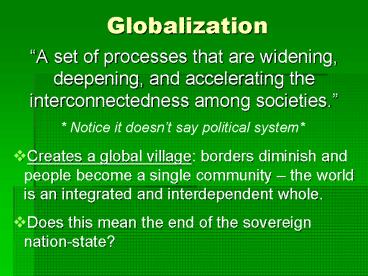Globalization PowerPoint PPT Presentation
1 / 12
Title: Globalization
1
Globalization
- A set of processes that are widening, deepening,
and accelerating the interconnectedness among
societies. - Creates a global village borders diminish and
people become a single community the world is
an integrated and interdependent whole. - Does this mean the end of the sovereign
nation-state?
Notice it doesnt say political system
2
The borderless world
- This is the Global Information Age, led by growth
in communications technology - Cell phones
- Computers Internet businesses/news, cyberspace
relationships, blogs (opinions) - Creates a digital divide between North South
- Agenda setting the media
- tells us what is important
- and what is not
3
Which part of the world controls the media? Is
this a source of soft power for the North? Who
controls the media in the North?
10 corporations
4
What has been globalized?
- Nationalism
- Religion
- Human rights issues
- Migration
- Health (AIDS, drug use, etc.)
- Culture
- Consumerism
5
Globalization of trade open, free trade will
lead to global integration, which will then
affect politics, human rights, etc.
- World Trade Organization
- 148 members (70 of the world)
- Successor to GATT, which reduced tariffs (tax
imposed by govts on imported goods) - WTO working to reduce non-tariff barriers
(non-tax govt restrictions) - Trade integration extent by which world trade
volume grows faster than world GDP ? creates
interdependence? globalization
6
Map 11.1
7
The Global South Trade
- Share of global trade has grown (from 23 in 1985
to 28 in 2005) - Its share of global exports in manufactured
products has also grown (from 10 in 1980 to 27
in 2005) - But 2/3 of this growth has come from only 6
countries (Asian tigers, or NICs) what about
the rest of the Global South?
8
Multinational Corporations
- Primary agents of globalization of production and
their goal is. PROFIT - 53,000 multinational corporations and 450,000
foreign subsidiaries of national corps. - Strategic corporate alliances (what we could call
monopolies in the US) - Rival nation-states in terms of resources most
MNCs have more many than most countries of the
Global South - Difficult for states to control states become
reliant on the jobs
9
Globalization of finance increasing
transnationalization or centralization of
financial markets through the worldwide
integration of capital flows the international
monetary system (currency exchange, investment,
loans, etc.)
- Borrowing, lending, currency trade, commercial
banking, foreign direct investment - MUCH higher turnover in foreign exchange (/- 2
trillion day) than trade - Arbitrage selling of one currency and purchase
of another to make a profit on the exchange rate - Speculative, based on projected currency
valuations - Keeps currencies balanced when it works, destroys
them when it doesnt
10
- Digital world economy has made national markets
extremely volatile and vulnerable. - Not centralized in any state - controlled by IMF,
World Bank under the - Capital mobility hypothesis the free flow of
investment capital across borders has led to the
globalization of finance - Why would a country open their borders to
investment capital and enter this volatile
market, making them vulnerable? - often required for membership in a regional
organization or trade block, or to receive direct
foreign investment
11
Critics say
- Leads to an increase in the north-south gap poor
get poorer while rich get richer, both within
countries and the world overall (dualism) - Leads to a loss of cultural diversity the world
becomes the same - Could lead to an erosion of sovereignty unless we
control it can we control it?
12
- How does globalization change the nature of the
state-centered international system? - Will globalization lead to global governance
(world govt.)? - Will globalization lead to a backlash a renewal
of state power over cultural/economic forces
seeking to control it? - Is globalization a potential threat to national
security?

